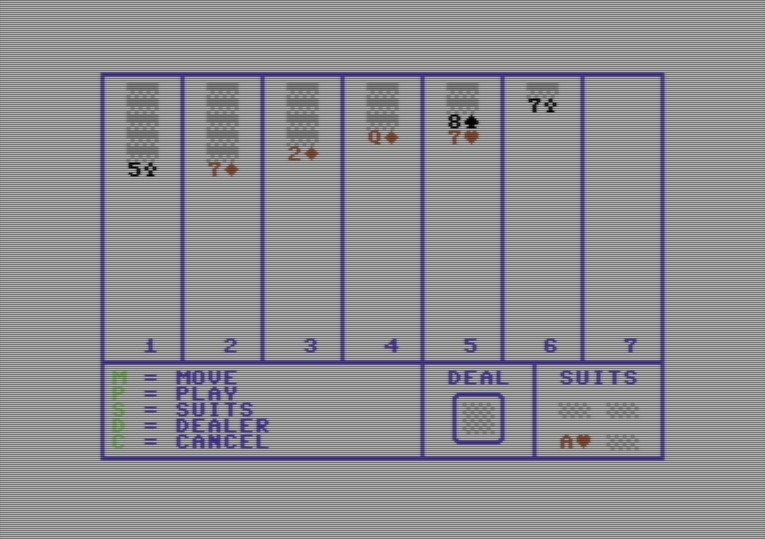It's entirely possible that I'll never know the first ever computerized card game. There are just so many branches and precursors throughout history that one begins to question what criteria to work under. It's not my intention to constantly move the goal posts. I could easily say, "This is the first computer solitaire game that supported the mouse." Or "This is the first solitaire to specifically run the game of Klondike." But there's always something older, yet more obscure. It seemed quite believable to me that Michael Casteel could have written the first computer Klondike - at least, it was believable when I wrote that article. Since then, I've learned that there are yet older implementations, under a variety of names and interfaces, and I'd be hard pressed to define the true progenitor. This, however, comes close...if only I could find more solid information about it.
The game of Patience was, according to MobyGames, released in 1983 by Commodore Business Machines for their Commodore 64 home computer. I've found some evidence that it was sold as a data cassette, and if I had to guess, it is written in BASIC. Patience simulates the game more commonly called Klondike in modern implementations, and is one of the handful of versions I know of that is 100% keyboard-driven. Patience is as old-school as it gets. There are no cursors to manipulate, no dragging or dropping. The cards are not even drawn as cards; every stack is a simple column drawn using the internal text characters. I recall being told that the PETSCII character set was specifically designed with the card suit icons built into it solely to encourage programmers to write card games on the machine. (ASCII is the same way.)

A game in progress, where I have moved only two cards.
To actually play a round of Patience, you use the rudimentary keyboard guide on screen to decide whether to move cards between columns, play a card from the waste pile, move cards to the foundations, or deal cards from stock. The terminology on screen is slightly confusing at first, as the MOVE key can't be used on the waste pile or to move a card to the suits, and the CANCEL key is not for backing out of commands you don't wish to use, but for aborting the game in progress (thankfully with a confirmation prompt). Interestingly, though, the SUITS key is not used on individual cards, but systematically checks every card on screen for whether it can be played to foundation, and keeps moving cards there until there are no more left that can be played. This very much resembles what modern solitaire games would call "auto play," and stands in stark contrast to the later games that would require the player to manually move every single card...even Windows Solitaire (until Windows XP, anyway).
Somehow, though, playing a solitaire game in such a manner is oddly relaxing. When you can't move cards as quickly as you possibly can (owed to the awkward interface and noticeable delay when moving), the game becomes more meditative, more deliberate. The only sound made by the machine is the occasional beep when a card is moved, at a pitch dependent on its column. The game does not even play music when victory is achieved; the only animation is a flashing "WELL PLAYED" message.

Winning at Patience produces flashing text and the question of whether to play again. Answering "no" just dumps you back to BASIC.
When I tried searching for information on Patience with which to write this article, I found more forum threads about waiting for load times in general than I did about the game. Patience, to a Commodore 64 owner, is far more than a game. It is waiting for a LOAD command to execute, waiting for the LIST to appear on screen, waiting for the tape to run, waiting for the data to de-crunch. It's waiting - sometimes for more than a minute - for your game to become playable, while occasionally a loader song plays in the background by the likes of Martin Galway or Rob Hubbard. The Commodore user must attain zen to fully utilize their computer. Patience, the game, may serve the Commodore owner as training towards Patience, the concept. For the rest of us, Patience can also serve as a reminder that things have not always been so simple, or perhaps that simplicity has a different meaning now than in the past.